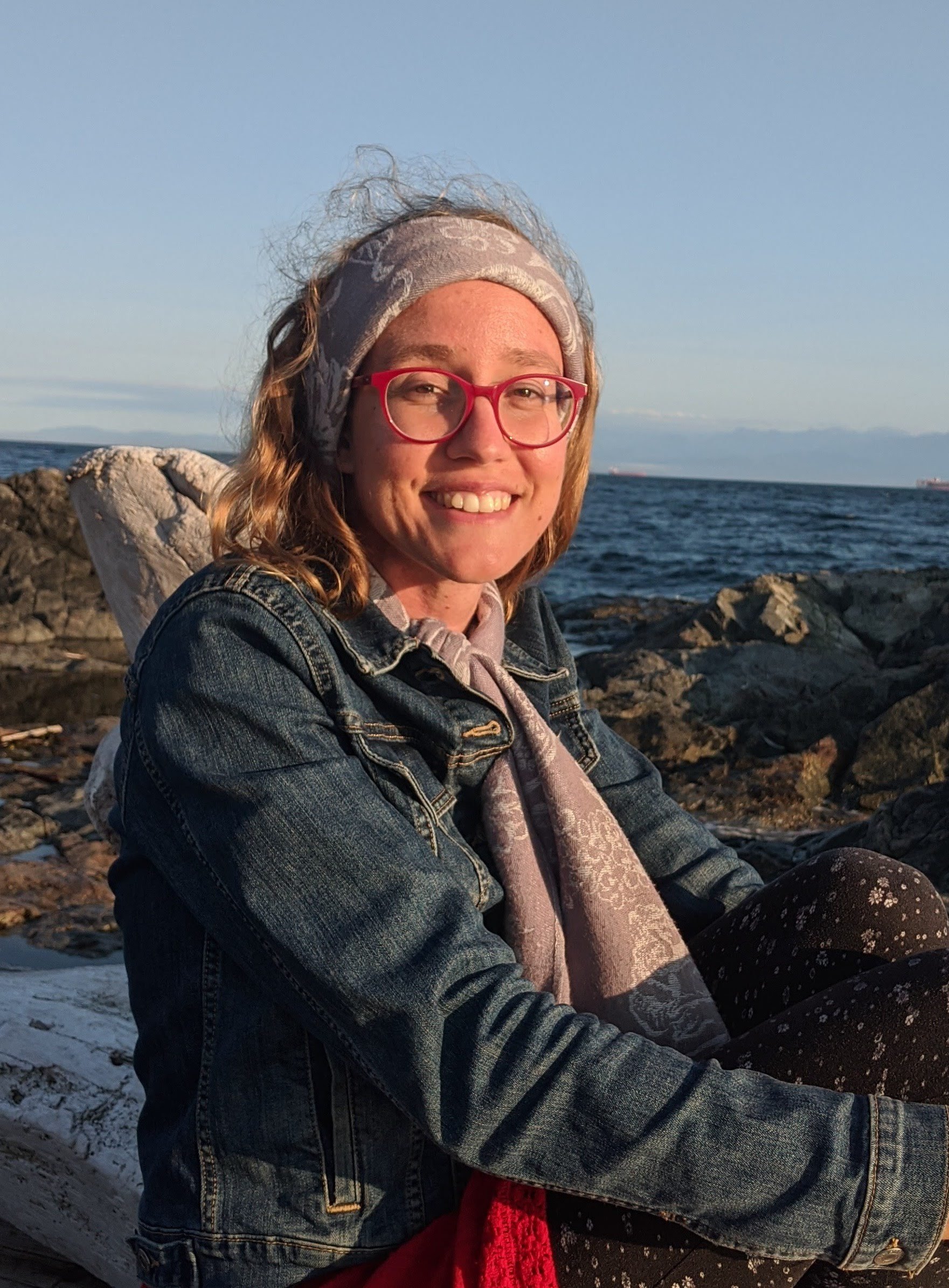Zoe Dickinson
Biography
Zoe Dickinson is a poet and bookseller from Victoria, British Columbia. Her poetry is rooted in the Pacific coastline, with a focus on local ecology and human relationships with nature. She has been published in literary journals such as Existere, Prairie Fire, and Contemporary Verse 2. Her first chapbook, Public Transit, was published in 2015 by Leaf Press, and her second chapbook, intertidal: poems from the littoral zone, is the 2022 winner of the Raven Chapbook competition. She is a manager at Russell Books and the Artistic Director of the Planet Earth Poetry Reading Series.
Poetics Statement
“Poetry is active empathy, distilled. Poetry can change the world, because poetry changes the way we see the world. Poetry is an electric arc that connects and illuminates, and leaves both observer and observed changed.
Jenny Odell calls artworks “training apparatuses for attention”; “if what we see forms the basis of how we act, then the importance of directing our attention becomes all too clear” (How to Do Nothing, 2019). This is what my poetry is for: to widen the cracks in myself and peek through, to look past myself at the world.
If we’re going to survive on this Earth – if this Earth is going to survive us – we need to fathom the wholeness of others’ experience and pay attention to the life around us, human and otherwise. We need to see each living creature as a being that matters in its own right: from mammal to mullusc to algae. This is what my poetry is for: to grab the human gaze and focus it on this beautiful, fragile world until it’s impossible to look away. ”
Sample of Poet's Work
I’d like to start by acknowledging
I’d like to start by acknowledging that this poem is being written on the unceded territories of the lək̓ʷəŋən speaking peoples: the Songhees and Esquimalt nations.
I’d like to start by acknowledging that I have no idea what that means –
I have the luxury of continuing to live my life
without understanding what I’ve stolen
I’d like to start by acknowledging that my life takes place where someone else’s life should be happening
that where my apartment building sits, someone should be gathering camas bulbs
but instead, not far away, she is boiling water before mixing her baby’s formula
I’d like to start by acknowledging that I fit perfectly into this long slow genocide
this machinery so silent
that I was born and raised on top of its invisible back
without ever hearing the sound of people dying
the sound of people rising, protecting, fighting
this machinery can’t stop killing
cradles my body as precious, but when I’m not in the room
bullets just slip out –
as though death
is a natural by-product
of keeping me safe
I’d like to acknowledge that I don’t know how to live here
without doing harm
but I don’t want to live anywhere else
I’d like to acknowledge that every day I make the choice to live on this land
and I’m saving my money, because some day I’d like to buy a piece of it
even though I know
it doesn’t belong to the current owners
even though I know
we cannot begin to repay what we continue to take
I’d like to acknowledge that I mouth words of acknowledgement
like a spell to ward off colonialism, like
a cloak to cover how comfortable I am here
living my life
on top of an ongoing struggle for survival
I pronounce and mispronounce these words
like a half-learned prayer, like
an excuse, like
a neon flashing sign that says “it’s not me, I didn’t do it”
as though saying it out loud
will somehow make me less complicit
I’d like to acknowledge that this poem was written
on the unceded territories of the lək̓ʷəŋən speaking peoples:
choosing to acknowledge or not acknowledge this truth
does not change the fact that I live inside it
every word that I read, write, think, and speak
has the power to reveal or obscure it
and if poetry is a way of learning to know the world
then I want my poems
to show this truth
not hide it
and if I’m honest
those are the only two choices
anemone advice
stand still long enough
to be mistaken for a flower –
paralyze them
with their own assumptions
if you want company,
tear yourself in half
a few times:
get to know yourself
through binary fission
share your flesh with someone
who can appreciate it –
invite something photosynthetic
inside:
like a dinoflagellate
accept nothing less than symbiosis
raise your limbs to the light
you can digest anything
if you hold it in your mouth long enough:
snail
crab
apology
spit out what does not serve you –
no point in hanging on
to someone else’s shell
hope for the human race
mosquitos live on nectar
alight on pin cherry blossoms
gentle as butterfly or bee
extract sweetness with needle-noses
leaving no itch
the blood they steal does not sustain them
it’s a selfless theft
desperate protein heist
to gain building blocks
for the next generation
the snowpool mosquito carries pollen in its eye
from orchid to orchid
1500 feet above sea level
how the orchid changes the mosquito’s view of the world
how the mosquito’s gaze carries messages
between flowers
after dark
how human blood
becomes a link in this ancient chain
and we
accidentally
nourish a constellation of blooms
is proof that even the worst pest
fulfills a purpose in the ecosystem
despite ourselves

